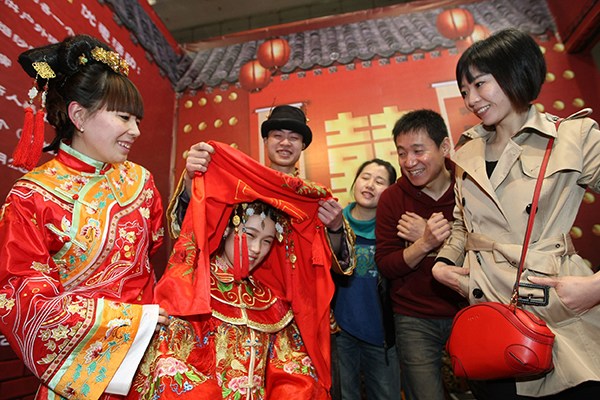
Business promotion staff dress in Chinese wedding clothes to promote folk wedding supplies during a recent wedding fair in Chongqing. (Photo provided to China Daily)
The fashion of hand-embroidered special-occasion dresses, like traditional Chinese gowns like Qipao and Guapao, is having a sort of revival in the China market, thanks to firms such as Tengxun Bridal and, in a sense, the Chinese first lady.
Lin Shuang, 35 years old, founded the Tengxun Bridal studio in 2009 after quitting her job with a major State-owned trading company in Beijing.
She grew up in the hutongs of Wangfujing area in Beijing. Her childhood extra-curricular activities included traditional Chinese drawing, calligraphy and traditional musical instruments.
When she took the plunge into the traditional Chinese fashion business, it was not considered a good move. Back then, fashion was not seen as an occupation with a bright future.
But Lin, a college graduate who majored in law, sensed business potential in the segment when her quest for a stunning Qipao for her soon-to-wed sister turned into a never-ending search.
A Qipao, a traditional form-fitting dress, consists of three layers of sleeves embroidered with gold threads of peony and a skirt with eight gold threads phoenix. Up to 400 hours over six months could go in to the making of a Qipao as intricate, painstaking sewing and embroidery work is needed.
"In the run-up to her wedding, my sister and I set out to buy a good-quality but affordable Qipao," said Lin. "But our search was in vain. We were very disappointed with the rough fabrics used."
So, Lin started to design a Qipao herself. She asked an established tailor whom her family had known for a long time to make one based on her design sketches.
The Qipao proved a massive hit. Everyone at the wedding raved about it. That encouraged Lin to convert a seemingly one-off exercise into a business.
Now, Lin's studio has grown into one of the largest high-end traditional Chinese wedding gown and clothing store in Beijing.
It features products from the bride's head-covering to traditional Chinese dragon and phoenix gowns, Qipao and Chinese shoes. On average, the store serves more than 200 newly-weds per year.
That's a far cry from the time when traditional Chinese wedding gowns were not such a hot pursuit for the newly-weds. Young Chinese were heavily influenced by Western styles then.
Even today, traditional Chinese wedding clothing takes up only 10 percent share of the special-occasion garment market.
"Brides in China often think about only the dresses that could make them look like a princess in the West," said Shi Yiping, a dress designer at the Beijing Institute of Fashion Technology. "Traditional Chinese gowns have been considered old-fashioned and outdated for many years now."
But in recent years, particularly after the country's first lady Peng Liyuan showed up at State events wearing traditional dresses that were an elegant mix of Chinese cultural elements and modern clothing, local fashion has been attracting attention again, Lin said.
"People have begun looking at Qipao and traditional Chinese gowns from a new perspective," said Lin. "Qipao now could be classic, stylish and elegant. The red color, gold and silver threads of embroidery of dragon, phoenix, fish and peony are symbols of a great marriage and good luck as well."
Last year, Tengxun doubled its sales (Lin would not disclose the numbers though). Investors are making a beeline for a stake to help expand her business. So much so Lin has decided to shut her line of Western wedding gowns and focus entirely on traditional Chinese gowns.
To ride the wave of new-found craze for Qipao, Tengxuna is sharpening its focus on targeted customers and also streamlining its management. "I work closely with the leaders in the wedding industry, particularly wedding planners," said Lin. "As soon as they sign on customers seeking a special Chinese wedding or a Chinese style section in their wedding, which requires traditional Chinese gowns, they recommend our service."
Given that specially made wedding gowns tend to be expensive, Tengxuna's strategy works better than mindless advertising, Lin said. "Our products are priced from 8,000 yuan to 100,000 yuan ($15,873). There is no need for us to compete with retailers on Taobao.com who sell Chinese wedding gowns at 1,000 yuan apiece."
"Hand drawings bring out more personal emotions and styles. Just like in the old times, I hope each gown I design and make will become a legacy that will be carried through generations of the bride's family," Lin said.


















































